考研英语十年真题超精读教案(基础篇)
2010年考研英语(一)阅读 text2精读精讲
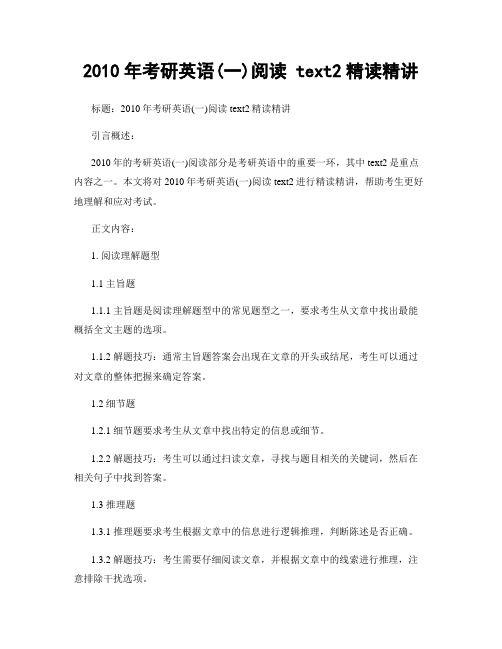
2010年考研英语(一)阅读 text2精读精讲标题:2010年考研英语(一)阅读 text2精读精讲引言概述:2010年的考研英语(一)阅读部分是考研英语中的重要一环,其中text2是重点内容之一。
本文将对2010年考研英语(一)阅读 text2进行精读精讲,帮助考生更好地理解和应对考试。
正文内容:1. 阅读理解题型1.1 主旨题1.1.1 主旨题是阅读理解题型中的常见题型之一,要求考生从文章中找出最能概括全文主题的选项。
1.1.2 解题技巧:通常主旨题答案会出现在文章的开头或结尾,考生可以通过对文章的整体把握来确定答案。
1.2 细节题1.2.1 细节题要求考生从文章中找出特定的信息或细节。
1.2.2 解题技巧:考生可以通过扫读文章,寻找与题目相关的关键词,然后在相关句子中找到答案。
1.3 推理题1.3.1 推理题要求考生根据文章中的信息进行逻辑推理,判断陈述是否正确。
1.3.2 解题技巧:考生需要仔细阅读文章,并根据文章中的线索进行推理,注意排除干扰选项。
2. 文章结构分析2.1 开头段落2.1.1 开头段落通常会引出文章的主题或背景信息。
2.1.2 解题技巧:考生可以通过阅读开头段落来了解文章的整体结构和主题。
2.2 主体段落2.2.1 主体段落是文章的核心部分,包含了文章的主要内容和观点。
2.2.2 解题技巧:考生需要仔细阅读主体段落,理解作者的观点和论证过程。
2.3 结尾段落2.3.1 结尾段落通常会总结文章的主要观点或提出作者的建议。
2.3.2 解题技巧:考生可以通过阅读结尾段落来了解文章的结论或作者的态度。
3. 阅读技巧3.1 阅读速度3.1.1 快速阅读可以帮助考生抓住文章的大意和主要观点。
3.1.2 解题技巧:考生可以通过快速阅读整篇文章,了解文章的结构和主题,然后再进行细读。
3.2 关键词3.2.1 关键词是文章中的重要信息,可以帮助考生理解文章的主题和细节。
3.2.2 解题技巧:考生可以通过寻找关键词,快速定位文章中的相关信息。
考研英语历年真题阅读理解精读笔记(一)

众所周知,考研是⼈⽣的⼀次重新洗牌和重⼤机遇,⽽在考研的四门课程中,英语成了许多考⽣前进征途上的⼀只凶猛拦路虎和⼗分困难的羁跘与障碍。
详细分析历年考研英语试卷,⼜可以发现主要⽭盾在于阅读(占60%的分数),故可谓:得阅读者得天下。
阅读的60分细分为Part A、Part B 和Part C,其中Part A为四篇阅读理解,占40分,是阅读理解考试中的主战场。
那么,阅读Part A有没有什么技巧呢? 技巧⼀:看懂 阅读理解其实主要考的是“阅读”之后的“理解”,所以,看得懂乃是第⼀项技巧。
任何⼀篇⽂章,若要能看懂它,⾄少需要两个条件:认识单词和看明⽩句⼦。
单词就像盖房的砖⽡,考研词汇⼤约为5500个,这不是⼀个⼩数字,也并⾮三两天时间可以记住的,所以,考⽣必须先买⼀本考研英语词汇书进⾏系统、长期的学习和记忆。
(推荐《考研英语词汇真题词频语境记忆》,该书打破了传统考研词汇书按字母顺序排序的做法,⽽是采⽤历年真题作为单词出现频率的统计依据,将所有⼤纲单词及超纲单词按照历年真题出现的频率从⾼到低排列,⽽且全部按照考过的不同词义配不同的真题例句,可以使学⽣⽤最少的时间获得的学习效果)。
拿到词汇书之后,⾸先⽤⼤约⼀周的时间把这些单词中你根本不认识的挑出来,如rear,tedious,deteriorate,plausible,jargon,isotope,……,(因为这些单词你可能完全不认识,看到之后两眼漆⿊,所以称之为“⿊”字)。
“⿊”字是阅读的头⼀个障碍,单词不认识,句⼦当然看不懂,所以,消灭“⿊”字是当务之急。
(争取⽤⼀个⽉左右的时间消灭它们!) 考研词汇中,除“⿊”字外,还有⼤量意思⾮常明⽩的所谓“⽩”字,如:able,benefit,culture,space,topic,……。
此类单词可⼀掠⽽过,除“⿊”(完全不认识)和“⽩”(完全明⽩)字两类外,还有许多似会不会的“灰”字,如:treaty,tutor,sample,saddle,fuss,……。
研究生英语读写教程(基础级)教学课件人大版Text B-Unit 10

Skim and Scan the text, and answer these questions:
▪ From the title, what do you predict the article might be about?
▪ Do you think what may lead to the scarcity of women’s voices in economics?
UNIT 10 ECONOMICS & MANAGEMENT
研究生英语读写教程(基础级)
Why Women’s Voices Are Scarce in Economics
研究生英语读写教程(基础级)
Section I: Lead-in Activities Section II: Text Exploration Section III: Language Focus Section IV: Keys to Exercises
- Detail 2: The report, which was published by the American Economic Association’s Committee for the Status of Women in the Economics Profession, shows… (para.4)
pass legislation to tackle the gender pay gap.
pay women and men equally for similar jobs.
Writing-style: topics/main ideas-supporting details essay:
Writers use supporting details to give readers more information about their topics and main ideas. Supporting details help readers answer questions they have about the topic or main idea. A writer may use examples, statistics, definitions, comparisons, quotation, (direct academic study, indirect academic study summary )anecdotes (short, interesting stories), or other forms of support to explain a topic or main idea.
研究生英语阅读教程(基础级 第二版)lesson 10

10READING SELECTION AAmerican Values at the Crossroads注黄字体为课后生词[1]Faced with the rapid change and the fear and uncertainty that go with it, individuals(citizens) as well as(and)nation sometimes seek to return to the ways of the past as a solution. In the early 1980s the idea of returning to the ways of the past had a strong appeal to(attraction)many Americans who increasingly viewed their past as being better than their future. It has been observed that until the 1970s Americans generally believed that the present was a better time for their country than the past and that the future would better than the present; by 1978, however,public opinion polls showed that many Americans had come to believe that just the opposite was true: the past had been better for the country than the present, and the present was better than the future would be.[2] The popular(present)appeal(desire)of returning to the ways(styles)of the past as a solution (solve->solution) to the problems of the 1980s was demonstrated(shown)when Ronald Reagan was elected President of the United States in 1980.Time magazine chose President Reagan as its "man of the year' and said of(commented)him: "intellectually, emotionally, Reagan lives in the past."[3] One of President Reagan's basic beliefs is that the United States should return as much as possible to its pre-1930 ways. In those times business institutions(organization)were strong and government institutions were weak. Reagan believed that American values of individual freedom and competition are strengthened by business and weakened by government. Therefore, his programs(goal/ objectives)as President have been designed to greatly strengthen business and reduce the size and power of the national government. By moving in this way toward the practices of the past, President Reagan believed that the standard of living of Americans would begin to improve once more(again)in the 1980s as it had done throughout most of the nation's history.[4] A number of leaders in politics, education, and the professions take a different approach (method)than does President Reagan. They believe that the nation must adopt(use/ make use of)new values to go along with(together with)the old values and that it must be prepared to make some changes in the old values when(it is)necessary.[5] What new values should be adopted? This is a very difficult question to answer. However, it became clear in the 1970s that there was no longer an abundance of cheap energy and that shortages of other essential(basic/most important)resources such as water were becoming more serious. These facts suggested(show)to many Americans that a greater value(should)be placed on the conservation of national resources, that is (namely/ i.e.), that Americans should save more of these resources by learning to use less and waste less.[6]Conservation has never been a strong American value. Because of the vast resources and space of North America, Americans came to believe that abundance was endless (unlimited). In such an environment, there seemed to be little need for conservation of resources. After World War II Americans believed that their modern technology could work(create)wonders and provide a never-ending increase in their standard of living. It is not surprising, therefore, that in the United States before the 1980s,conservation had little importance(when it is)compared with such other values as freedom, equality of opportunity, hard work, and the accumulation of material wealth.[7] There is some evidence that the experience of greater shortages of energy during the 1970s caused Americans to place more emphasis on conservation. For example, a poll(survey)taken at the end of the decade showed that 66% of Americans agreed with the statement: "I'm not unhappy about the possibility of shortages because I know it will encourage(urge)me to use everything efficiently and not wastefully."[8] Some people, however, believe that poll results like these reveal only part of the truth.Although Americans may agree with statements supporting the value of conservation, most of them are not yet applying these beliefs in their day-to-day(daily)actions (life).[9] Belief in conservation, therefore, is still weak(when it is)compared with other American beliefs. It can become stronger only as(when)Americans see the need for it more and more clearly. Conservation may well be (become)a new value which needs to be added to the old basic values in order to help the United States deal with its future problems.[10] A second belief which has never been strong among the American people is the belief that the value of cooperation on a national scale to achieve some important national(goal)objectives. The American idea of the national good(n./ benefit/ interest)has never been based on national cooperation but rather on the freedom of the individual. Americans, therefore, tend to think of the national good in terms of maintaining(keeping)those conditions that provide the greatest freedom for the individual. They believe that a nation of free individuals will be naturally strong and prosperous. Planned efforts at national cooperation, therefore, are not needed. More important, planned efforts at national cooperation would mean increasing the powers of the national government, which would endanger the freedom of the individual.[11] The American value of competition also hinders the development of a spirit of national cooperation. Even though competitive activity is supposed to(=should)be conducted(directed/ done) according to fair rules (fair play), it does not encourage a spirit of cooperation. Rather (instead/ On the contrary), it sometimes encourages a spirit of mutual suspicion(suspect)of the motives(purpose/ desire)of the others. A certain degree of trust in the motives of others is necessary for the success of efforts in national cooperation.[12] In time of war Americans have temporarily put aside their dislike of planned national cooperation. They have been willing to cooperate and make personal sacrifices under the direction (=leadership)of the national government to bring the war to satisfactory conclusion (=end). In peacetime, however, planned national cooperation is strongly resisted as a threat to individual freedom.[13] The almost (nearly) unique American historical experience gives us a deeper understanding of this attitude. Almost every nation in the world has had, or still has, the experience of being ruled by kings, emperors,dictators, or a hereditary class of aristocrats. Such rulers are not elected by the free votes of the people and they have the power to say what the national good is and to force their people to cooperate if they cannot persuade them to do so. Out of(among)these experiences there have developed traditions and habits of cooperation, sometimes for good purposes and sometimes for evil (bad/ wrong)purposes.[14] Americans have never had the experience of being forced to cooperate on a national scale by nonelected rulers. For a time, they were the colonists of Great Britain and were legally(bind)bound to obey rulers in England whom they did not elect, but the British government allowed the colonists a great deal of freedom and self-government by the standards of the day. Still(Furthermore)the American colonists were not long(soon)in demanding (requiring) more freedom and self-government, and finally declaring their independence in 1776. From the time of their independence, Americans have freely elected their rulers. The experience of being compelled to cooperate by unelected national leaders is completely foreign(strange)to their experience. They are fearful(=fear)that any scheme (plan) of national cooperation in peacetime will weaken or destroy their freedoms.[15] Americans have always viewed(considered/ regarded)cooperation as important in small groups such as the family, the neighborhood, or the church. But on the large national scale where government becomes involved, it is seen(considered/ regarded)as coercive and destructive rather than voluntary and constructive.American tend to associate the greatness of their nation far more with such values as individual freedom, equality of opportunity, hard work, and competition than with national cooperation.[16] Yet the demands(=needs)of the 1980s may compel (force) Americans to place(emphasize)a greater value on national cooperation. It may well be that some of the problems facing them, such as scarcity of resources and the dangers of air and water pollution, cannot be solved without a greater degree of national cooperation.[17] If Americans choose (=decide) to give more emphasis to national cooperation, they will probably be very cautious about it. In order to protect their freedoms, they will move slowly in a step-by-step, problem-by-problem fashion (way), rather than accept a sweeping new plan involving dramatic change. Because of their tradition of self-government, they will probably insist on(persist in doing sth.)a good deal of public discussion before any step toward national cooperation is taken.[18] Some observers believe that this slow, cautious approach may be too weak and too timid to meet the challenges of the future. Americans, however, believe that sudden revolutionary changes made in the name of(in the honor)the national good usually result in(lead to)dictatorships in which freedom is lost and problems remain unsolved.[19] In the 1980s Americans may have arrived at a critical point in their nation's history, where major dangers must be faced and major choices must be made.On the one hand, they will wish to avoid the risk of making too many changes in the basic values which have inspired(encouraged)them in the past. On the other hand, they must avoid what may be the greater risk of refusing to change their values at all even though conditions are changing rapidly all around them. The events of the past two decades have brought the American people and their basic values to a crossroads in their history. The last two decades of the twentieth century will determine where they will go from there. (1, 530 words) II. VocabularyA. Complete each the following sentences with the appropriate forms of the words given.注每个题目后面出现的相同标号的题目是备考查单词在课文里出现的原句1. He hoped to strengthen (strength) the position of the sciences in the leading universities.(1)Reagan believed that American values of individual freedom and competition are strengthened by business and weakened by government.(1)Therefore, his programs(goal/ objectives)as President have been designed to greatly strengthen business and reduce the size and power of the national government.2. We took an abundant(abundance) supply of food with us when we went hiking in the mountains.(2)However, it became clear in the 1970s that there was no longer an abundance of cheap energy and that shortages of other essential(basic/most important)resources such as water were becoming more serious.Because of the vast resources and space of North America, Americans came to believe that abundance was endless (unlimited).3.Conservation (conserve) is the protection of plants and animals, natural areas, and interesting and important structures and buildings, especially from the damaging effect of human activity.(3)These facts suggested (show) to many Americans that a greater value (should)be placed on the conservation of national resources, that is (namely/ i.e.), that Americans should save more of these resources by learning to use less and waste less.Conservation has never been a strong American value.In such an environment, there seemed to be little need for conservation of resources.There is some evidence that the experience of greater shortages of energy during the 1970scaused Americans to place more emphasis on conservation.Although Americans may agree with statements supporting the value of conservation, most of them are not yet applying these beliefs in their day-to-day (daily) actions (life).Belief in conservation, therefore, is still weak (when it is) compared with other American beliefs.It is not surprising, therefore, that in the United States before the 1980s,conservation had little importance (when it is)compared with such other values as freedom, equality of opportunity, hard work, and the accumulation of material wealth.Conservation may well be (become) a new value which needs to be added to the old basic values in order to help the United States deal with its future problems.4. And if you're emotionally connected to it, you also get intellectually (intellect) connected to it; you want to learn more about it.(4)Time magazine chose President Reagan as its "man of the year' and said of (commented) him: "intellectually, emotionally, Reagan lives in the past."5. Relief (rescue/ relieve)workers are concerned over(=worried about)the shortage (short) of food and shelter in the refugee camps. (shelter sb. from sth./ seek refuge)(5)However, it became clear in the 1970s that there was no longer an abundance of cheap energy and that shortages of other essential (basic/most important) resources such as water were becoming more serious.There is some evidence that the experience of greater shortages of energy during the 1970s caused Americans to place more emphasis on conservation.For example, a poll (survey) taken at the end of the decade showed that 66% of Americans agreed with the statement: "I'm not unhappy about the possibility of shortages because I know it will encourage (urge) me to use everything efficiently and not wastefully."6. It is proposed(=suggested)at this conference that the law should impose penalties on companies that use energy wastefully (waste). [suggest sb. (doing) sth./ that sb do sth.]= [sb. (should) do sth.](6)For example, a poll (survey) taken at the end of the decade showed that 66% of Americans agreed with the statement: "I'm not unhappy about the possibility of shortages because I know it will encourage (urge) me to use everything efficiently and not wastefully."7. It is hard(difficult)to believe that in this prosperous (prosper) country, hunger could be a serious problem.(7)They believe that a nation of free individuals will be naturally strong and prosperous. Planned efforts at national cooperation, therefore, are not needed.8. We must be careful not to do anything that might endanger (danger) the economic recovery.(8)More important, planned efforts at national cooperation would mean increasing the powers of the national government, which would endanger the freedom of the individual.9. This disease is hereditary (heredity), so chances are(possibly/ likely)that her daughter may suffer from it too.(9)Almost every nation in the world has had, or still has, the experience of being ruled by kings, emperors,dictators, or a hereditary class of aristocrats.10. The president relied on(=depend on)the coercive (coerce) powers of the military and the police to enforce law and order.(10)But on the large national scale where government becomes involved, it is seen (considered/ regarded)as coercive and destructive rather than voluntary and constructive.B. Choose the best ward or expression from the list given for each blank. use each word or expression only once and make proper changes where necessary.bound to compel dictator constructive suspiciongo along with appeal accumulation endanger mutual注每个题目后面出现的相同标号的题目是备考查单词在课文里出现的原句1. The main appeal(attraction)these bonds hold for(is meaningful)individual investors is the safety and peace of mind they offer (give). (sth.appeals to sb.)(1)In the early 1980s the idea of returning to the ways of the past had a strong appeal to (attraction) many Americans who increasingly viewed their past as being better than their future.The popular (present)appeal (desire) of returning to the ways (styles) of the past as a solution (solve->solution) to the problems of the 1980s was demonstrated (shown) when Ronald Reagan was elected President of the United States in 1980.2. He argues that Americans have been too compliant (=obedient), too willing(ready)to go along with politicians who would reduce their liberties (=freedom), not expand them. (statute of liberty)(2)They believe that the nation must adopt (use/ make use of) new values to go along with (together with) the old values and that it must be prepared to make some changes in the old values when (it is) necessary.3. Despite(=in spite of)these improvements the scientists say that the Baltic Sea continues to be "imperiled(endangered)by the long-term accumulation of toxic (poisonous) chemicals".(3)It is not surprising, therefore, that in the United States before the 1980s, conservation had little importance(when it is)compared with such other values as freedom, equality of opportunity, hard work, and the accumulation of material wealth.4. Toxic(poisonous)waste could endanger lives and poison fish.(4)More important, planned efforts at national cooperation would mean increasing the powers of the national government, which would endanger the freedom of the individual.5. The East and the West can work together for their mutual benefit and progress.(5)Rather (instead/ On the contrary),it sometimes encourages a spirit of mutual suspicion (suspect) of the motives (purpose/ desire) of the others.6. The authorities will be legally bound(bind)to arrest any suspects.(6)For a time, they were the colonists of Great Britain and were legally(bind)bound to obey rulers in England whom they did not elect, but the British government allowed the colonists a great deal of freedom and self-government by the standards of the day.7. In the United States cyclists are compelled to wear a helmet for the sake of safety. circle->cycle-bicycle(7)From the time of their independence, Americans have freely elected their rulers. The experience of being compelled to cooperate by unelected national leaders is completely foreign (strange)to their experience.Yet the demands(=needs)of the 1980s may compel (force) Americans to place(emphasize)a greater value on national cooperation.8. Following the fall of the military dictator in March, the country has had a civilian (<->military)government.(8)Almost every nation in the world has had, or still has, the experience of being ruled by kings, emperors,dictators, or a hereditary class of aristocrats.9. After their meeting, both men described the talks as frank, friendly and constructive(<->destructive; positive<->negative).(9)But on the large national scale where government becomes involved, it is seen (considered/ regarded) as coercive and destructive rather than voluntary and constructive.10. He was arrested on suspicion of drunk driving. (suspect)(10)Rather (instead/ On the contrary), it sometimes encourages a spirit of mutual suspicion (suspect)of the motives(purpose/ desire)of the others.课文参考译文第+课A处在+字路口的美国价值观爱德华· N·卡尼[l]面对急剧的社会变化以及与之俱来的恐惧和不稳定感,无论个人还是国家时而都会想起以往的模式,以求应对。
专家指导:考研英语十年真题使用方法.doc

主旨存在的位置,为做题积累经验,提高自
学能力。
第三,选项分析成为研析真题十分重要的组成部分。
我们在第一点中提到接受正确选项的思路,但是我们对选项分析不仅需要指导正确选项之所以对的原因,更需要知道错误选项未选的原因,这样我们才能明白自己为什么选错,并且避免再犯。
在这个研究层面,考生还可以比对同一类题目(如阅读中的主旨大意题)的正确选项特点,以及错误选项的共同点,由此,我们不仅能够更好地把曾经学过的技巧运用,还可以总结出自己的学习方法,提高学习效率。
上面讲到的是试卷上客观题部分的利用方法,接下来我们对主观题部分(写作部分)稍作分析。
首先,小作文从2005年设置在试卷上至今只有5年的真题源,但是我们从中仍然可以了解到命题方式。
在这五年的命题中,全部考查了信函写作,所以信函的格式与内容安排我们必须掌握。
结合高分范文学习经典句型及信函结构,充分利用真题的价值。
其次,大作文在近十年的真题中均以图画的形式出现,所以这样丰富的资源为我们提供的不仅是大量的题源,更是命题的趋势,以图画作文为复习重点,通过对真题图画的分析,学会读图得出大意的能力。
同样可以从范文中学习优秀表达,模仿联系,使其转化为自己的拿分句型。
英语一精读课程设计

英语一精读课程设计一、教学目标本课程的教学目标是使学生掌握英语精读的基本技巧,提高学生的英语阅读理解能力,增强学生的英语语感,提升学生的英语写作和口语表达能力。
具体分为以下三个部分:1.知识目标:通过本课程的学习,学生需要掌握精读的基本技巧,如理解文章的主旨和作者的观点,分析文章的篇章结构,理解并运用文章中的关键词汇和语法点。
2.技能目标:学生需要通过精读练习,提高阅读速度和理解能力,能够准确理解文章中的信息,并能够对文章进行深入分析。
3.情感态度价值观目标:通过阅读不同类型的英语文章,学生能够开阔视野,增强对不同文化的理解和尊重,培养积极的学习态度和良好的学习习惯。
二、教学内容本课程的教学内容选取自英语精读教材,主要包括以下几个部分:1.英语精读的基本技巧和方法,如理解文章的主旨和作者的观点,分析文章的篇章结构,理解并运用文章中的关键词汇和语法点。
2.各类型英语文章的阅读和分析,包括叙述文、说明文、议论文等。
3.针对文章内容进行深入分析和讨论,提高学生的英语阅读理解能力。
三、教学方法为了达到本课程的教学目标,我们将采用以下几种教学方法:1.讲授法:教师将向学生介绍英语精读的基本技巧和方法,并通过讲解实例让学生理解和掌握。
2.讨论法:教师将引导学生对文章内容进行深入分析和讨论,提高学生的英语阅读理解能力。
3.案例分析法:教师将提供一些实际案例,让学生运用所学的精读技巧和方法进行分析,提高学生的实际操作能力。
四、教学资源为了支持本课程的教学内容和教学方法的实施,我们将准备以下教学资源:1.教材:我们将使用英语精读教材,作为学生学习的基础资源。
2.参考书:我们将提供一些英语阅读理解的参考书籍,供学生自主学习和参考。
3.多媒体资料:我们将使用多媒体资料,如视频、音频等,丰富学生的学习体验,提高学生的学习兴趣。
4.实验设备:我们将提供一定的实验设备,让学生能够进行实际操作,提高学生的实际操作能力。
五、教学评估本课程的评估方式包括平时表现、作业和考试三个部分,每个部分所占比例分别为30%、30%和40%。
考研英语阅读基础讲义
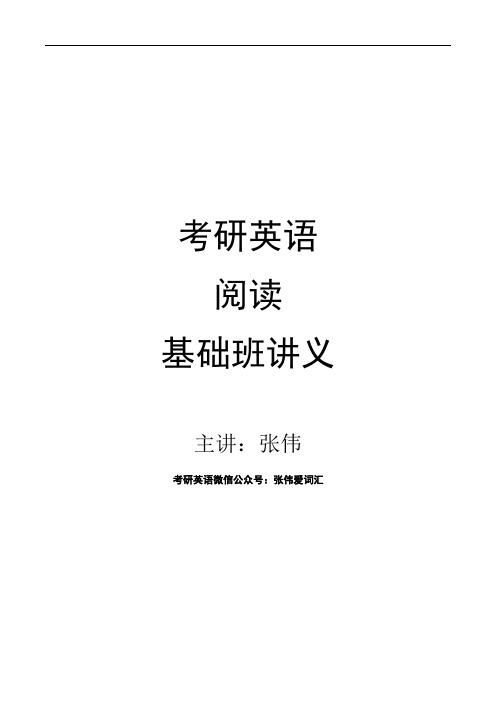
考研英语阅读的基本情况 首先我们要对阅读考试的特点有个基本了解。 老张总结考研英语阅读的特点: 出题有题源; 题材有偏好; 体裁有重点; 结构有套路; 文风有特点;
作为阅读理解 A 部分,4 篇文章,一般有 1600 词,题材来源为:经济商业、社会热点、文化 教育、科普知识、法律等方面,出现率最高的是社会生活、科普和经济,其余的还包括体育、 人物传记等。社会生活体裁包括文化、历史、家庭、教育、人口、交通、环境能源及其他社会 现象。从国家的角度来分析,一般以欧美,特别是美国的话题为主,因为文章主要也是来源于 欧美的主流报刊。 考研阅读理解文章的题材多样,有议论文、说明文和应用文。希望大家注意不同体裁的文章不 同考试要点:对于说明文,要注意事实和数据;对于议论文而言,要注意作者的结论和观点, 作者证明观点的论据部分和逻辑结构,以及作者对其他观点的态度。 近几年的真题来看,70% 以上的文章都是偏议论文。这对我们写作借鉴也有意义。
A business, also known as an enterprise or a firm, is an organization involved in the trade of goods, services, or both to consumers. Businesses are prevalent in capitalist economies, where most of them are privately owned and provide goods and services to customers in exchange for other goods, services, or money. Businesses may also be not-for-profit or state-owned. A business owned by multiple individuals may be referred to as a company.
研究生基础综合英语(邱东林版)课文中英对照加课后习题答案
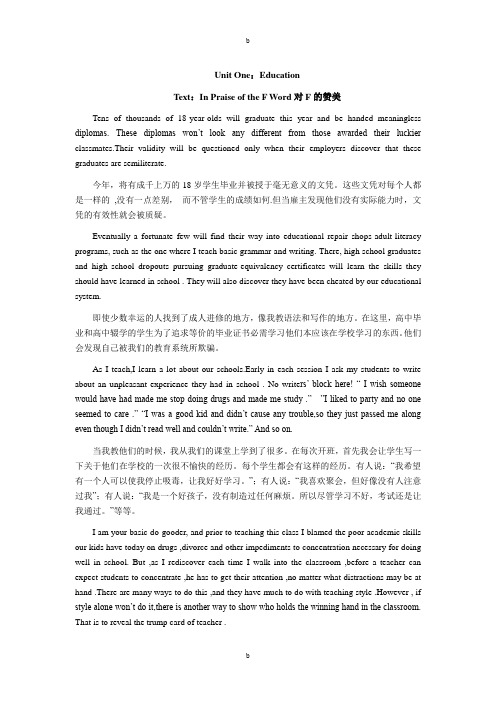
Unit One:EducationText:In Praise of the F Word对F的赞美Tens of thousands of 18-year-olds will graduate this year and be handed meaningless diplomas. These diplomas won’t look any different from those awarded their luckier classmates.Their validity will be questioned only when their employers discover that these graduates are semiliterate.今年,将有成千上万的18岁学生毕业并被授于毫无意义的文凭。
这些文凭对每个人都是一样的,没有一点差别,而不管学生的成绩如何.但当雇主发现他们没有实际能力时,文凭的有效性就会被质疑。
Eventually a fortunate few will find their way into educational repair shops-adult-literacy programs, such as the one where I teach basic grammar and writing. There, high school graduates and high school dropouts pursuing graduate-equivalency certificates will learn the skills they should have learned in school . They will also discover they have been cheated by our educational system.即使少数幸运的人找到了成人进修的地方,像我教语法和写作的地方。
研究生英语阅读教程基础级第三版教学设计

研究生英语阅读教程基础级第三版教学设计引言研究生英语阅读教程基础级是针对研究生开设的一门课程,旨在提高学生的英语阅读能力,提高其英语文献的查阅和阅读能力,为其后续研究奠定良好的英语基础。
本文将对该课程的教学设计进行详细的介绍和阐述。
教学目标1.通过本课程的学习,能够扩大学生的英语词汇量,掌握更多英语语法知识,提高英语语言水平;2.帮助学生掌握英语文献的阅读技巧和方法,提高阅读效率和质量;3.学习英语阅读的基本技能,着重培养学生的阅读理解、细节把握及词汇拓展能力;4.强化学生对英语内容的理解和应用能力,开阔思维、提升学术水平。
教学内容第一章:阅读基础知识•阅读的定义和类型•阅读过程中的基本技能和方法•阅读理解能力的培养第二章:扩大词汇量•词汇学习的基本方法和技巧•重点词汇的记忆和运用•词根、词缀及同义反义词的运用第三章:学习语法和结构•英语语法的基本知识•从阅读中学习语法和结构•学习语法和结构对英语阅读的帮助第四章:学术阅读•学术英语阅读的基本技巧和方法•阅读学术论文和课本式英语的对比•学术英语中常用语言结构和表达方法第五章:阅读策略和技巧•阅读前的准备和思路构建•阅读时的技巧和方法•阅读后的总结和归纳教学方法•课堂授课与学生自学相结合;•以课本为主,辅以教师演示和阅读考试;•每个章节设置策略和技巧的训练,加强学生对阅读策略和技巧的掌握;•课程结束前进行复习和回顾。
评估方式•课堂作业:每章节课后会留下一定练习;•阅读考试:每章结束后举办一次阅读考试;•阅读报告:每学期要求学生提交一篇英语阅读报告,包括文献总结和分析。
结束语通过本课程的学习和教学,可完善地提高研究生的英语阅读水平,拓展学生对英语学习的视野和思路,同时也为其后续的英语写作提供良好的基础。
希望本教学设计能够得到广大教师的认可,同时更能使学生得到比较优秀的教育结果。
英文精读备课教案模板范文

---Subject: EnglishGrade Level: [Specify Grade Level]Lesson Topic: [Specify Lesson Topic]Teaching Objectives:1. Knowledge and Skills Objectives:- Students will be able to understand the main ideas and details of the text.- Students will learn and use new vocabulary and grammar structures.- Students will improve their reading comprehension skills.2. Process Objectives:- Students will engage in active reading and participate in discussions.- Students will practice critical thinking and inferential skills.3. Attitude and Values Objectives:- Students will appreciate the importance of reading and understanding diverse perspectives.Teaching Key Points:1. Understanding the main ideas and themes of the text.2. Recognizing and using new vocabulary and grammar structures.3. Applying critical thinking skills to analyze the text.Teaching Difficult Points:1. Understanding complex sentences and word meanings.2. Synthesizing information to draw conclusions.Teaching Methods:1. Guided Reading2. Discussion and Group Work3. Multimedia ResourcesTeaching Process:1. Warming Up (5 minutes)- Start with a brief review of previous lessons.- Engage students in a relevant conversation or activity to stimulate their interest in the topic.2. Introduction (10 minutes)- Introduce the topic and background information.- Present the main characters, setting, and plot.- Highlight the main themes and objectives of the lesson.3. Reading Activity (20 minutes)- Guided Reading: Divide the text into sections and guide students through each section.- Skimming and Scanning: Encourage students to quickly find specific information.- Stop and Discuss: Pause at certain points to discuss the text with the class.4. Vocabulary and Grammar (15 minutes)- Introduce new vocabulary and grammar structures.- Provide examples and practice exercises.- Encourage students to use new vocabulary and structures in their responses.5. Group Work (15 minutes)- Divide students into small groups.- Assign a specific task, such as summarizing the text, identifying themes, or analyzing characters.- Allow students to collaborate and share their findings with the class.6. Discussion and Summary (10 minutes)- Facilitate a class discussion on the text.- Encourage students to share their thoughts and opinions.- Summarize the main points of the lesson and reinforce key concepts.7. Homework Assignment (5 minutes)- Assign relevant homework to reinforce learning, such as writing a short essay, creating a poster, or preparing a presentation.Assessment:- Participation in class discussions and group activities.- Completion of homework assignments.- A quiz or test on vocabulary and grammar.Additional Resources:- Textbook and supplementary materials.- Online resources and multimedia content.- Vocabulary cards and grammar exercises.---Note: This template can be adapted to fit the specific needs of your students and the content of the text. Remember to be flexible and responsive to your students' learning styles and needs.。
2010英语一阅读精读
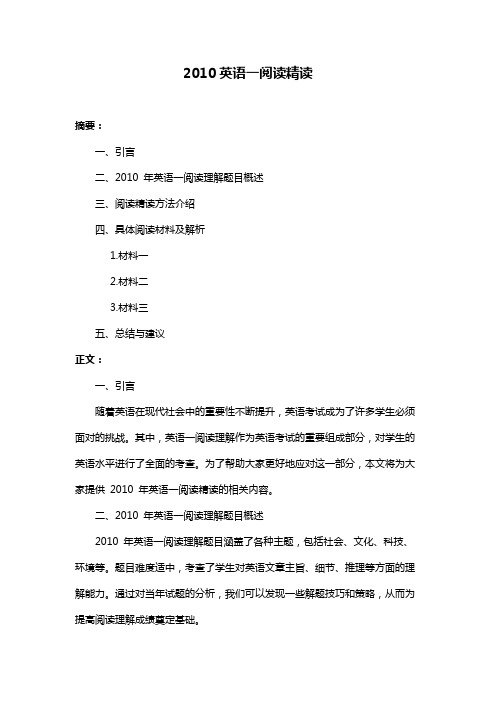
2010英语一阅读精读摘要:一、引言二、2010 年英语一阅读理解题目概述三、阅读精读方法介绍四、具体阅读材料及解析1.材料一2.材料二3.材料三五、总结与建议正文:一、引言随着英语在现代社会中的重要性不断提升,英语考试成为了许多学生必须面对的挑战。
其中,英语一阅读理解作为英语考试的重要组成部分,对学生的英语水平进行了全面的考查。
为了帮助大家更好地应对这一部分,本文将为大家提供2010 年英语一阅读精读的相关内容。
二、2010 年英语一阅读理解题目概述2010 年英语一阅读理解题目涵盖了各种主题,包括社会、文化、科技、环境等。
题目难度适中,考查了学生对英语文章主旨、细节、推理等方面的理解能力。
通过对当年试题的分析,我们可以发现一些解题技巧和策略,从而为提高阅读理解成绩奠定基础。
三、阅读精读方法介绍阅读精读是一种深入理解文章内容的方法,主要包括以下几个步骤:1.预览:快速浏览文章标题、副标题、图片等,对文章主题有一个初步了解。
2.逐段阅读:仔细阅读每一段,理解段落主旨,并找出关键词和核心句。
3.总结全文:概括文章主题,梳理文章结构,明确作者观点和态度。
4.分析题目:针对题目,回到原文查找相关信息,进行筛选和判断。
5.检查答案:确保答案符合题意,语言表达准确。
四、具体阅读材料及解析以下是对2010 年英语一阅读理解部分的三篇材料的解析:1.材料一文章主题:全球变暖对极地生态系统的影响文章结构:第一段:全球变暖对极地生态系统的影响日益严重第二段:极地生态系统的变化对全球气候产生负面影响第三段:科学家建议采取措施减缓全球变暖对极地生态系统的破坏2.材料二文章主题:网络成瘾现象及其影响文章结构:第一段:网络成瘾现象日益普遍,引起了社会关注第二段:网络成瘾对个人生活和工作的影响第三段:网络成瘾的成因及治疗方法3.材料三文章主题:城市化对生态环境的影响文章结构:第一段:城市化对生态环境产生负面影响第二段:城市化导致资源消耗和环境污染问题第三段:解决城市化带来的生态环境问题的对策五、总结与建议通过以上对2010 年英语一阅读理解的精读分析,我们可以得出以下建议:1.多读英语文章,提高阅读速度和理解能力。
考研英语教案参考答案

考研英语教案参考答案一、教学目标1. 掌握考研英语阅读理解的解题技巧。
2. 提升学生对英语长难句的理解和分析能力。
3. 培养学生的英语写作能力,特别是议论文的写作技巧。
4. 加强学生对英语词汇、语法和句型的运用能力。
二、教学内容1. 阅读理解- 快速阅读技巧:如何快速捕捉文章主旨和关键信息。
- 细节理解题:如何定位信息并准确回答问题。
- 推理判断题:如何根据文章内容进行逻辑推理和判断。
2. 长难句分析- 识别长难句中的主干结构。
- 分析从句和非谓语动词的使用。
- 理解复杂句型的逻辑关系。
3. 写作技巧- 议论文的写作框架:如何构建清晰的论点、论据和结论。
- 论证方法:举例论证、对比论证、因果论证等。
- 写作语言:如何使用恰当的词汇和句型使文章更有说服力。
4. 词汇与语法- 考研英语高频词汇的记忆与运用。
- 语法结构的掌握:时态、语态、非谓语动词等。
- 句型的灵活运用:并列句、复合句、强调句等。
三、教学方法1. 讲解与示范:教师通过讲解和示范,帮助学生理解知识点。
2. 互动讨论:鼓励学生参与课堂讨论,提高学习兴趣和参与度。
3. 练习与反馈:通过大量的练习题,让学生巩固所学知识,并给予及时反馈。
4. 模拟测试:定期进行模拟测试,检验学生的学习效果。
四、教学过程1. 导入(5分钟)- 通过提问或展示相关图片,激发学生对考研英语的兴趣。
2. 讲解(20分钟)- 教师详细讲解阅读理解技巧、长难句分析方法、写作技巧以及词汇与语法要点。
3. 练习(15分钟)- 学生独立完成练习题,教师巡回指导。
4. 讨论(10分钟)- 学生分组讨论练习题中的难点,教师参与并给予指导。
5. 反馈(5分钟)- 教师对练习题进行点评,指出学生常见的错误和不足。
6. 模拟测试(15分钟)- 学生完成模拟测试,教师在测试后进行讲解。
7. 总结(5分钟)- 教师总结本节课的重点和难点,强调学生需要掌握的关键点。
五、作业布置1. 完成指定的阅读理解练习题。
10月4日-2017考研英语真题阅读5夜10篇精读直播随堂笔记(何凯文)
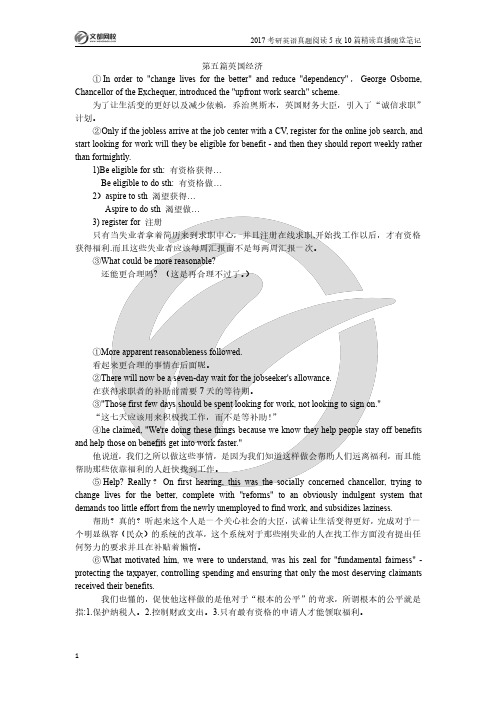
第五篇英国经济①In order to"change lives for the better"and reduce"dependency",George Osborne, Chancellor of the Exchequer,introduced the"upfront work search"scheme.为了让生活变的更好以及减少依赖,乔治奥斯本,英国财务大臣,引入了“诚信求职”计划。
②Only if the jobless arrive at the job center with a CV,register for the online job search,and start looking for work will they be eligible for benefit-and then they should report weekly rather than fortnightly.1)Be eligible for sth:有资格获得…Be eligible to do sth:有资格做…2)aspire to sth渴望获得…Aspire to do sth渴望做…3)register for注册只有当失业者拿着简历来到求职中心,并且注册在线求职,开始找工作以后,才有资格获得福利.而且这些失业者应该每周汇报而不是每两周汇报一次。
③What could be more reasonable?还能更合理吗?(这是再合理不过了。
)①More apparent reasonableness followed.看起来更合理的事情在后面呢。
②There will now be a seven-day wait for the jobseeker's allowance.在获得求职者的补助前需要7天的等待期。
③"Those first few days should be spent looking for work,not looking to sign on."“这七天应该用来积极找工作,而不是等补助!”④he claimed,"We're doing these things because we know they help people stay off benefits and help those on benefits get into work faster."他说道,我们之所以做这些事情,是因为我们知道这样做会帮助人们远离福利,而且能帮助那些依靠福利的人赶快找到工作。
精读教案

教案
2006 ~~ 2007 学年第 1 学期
院(系、所、部)南海校区(学院)英语系教研室专业基础教研室
课程名称精读
授课对象
授课教师
职称职务讲师
教材名称《综合英语教程》
2006年9 月28 日
精读课程教案
精读课程教案
精读课程教案
精读课程教案
精读课程教案
精读课程教案
精读课程教案
精读课程教案
精读课程教案
精读课程教案
精读课程教案
精读课程教案
精读课程教案
精读课程教案
精读课程教案
精读课程教案
精读课程教案
精读课程教案
精读课程教案
精读课程教案
精读课程教案
精读课程教案
精读课程教案
精读课程教案
精读课程教案
精读课程教案
精读课程教案
精读课程教案
精读课程教案
精读课程教案
精读课程教案
精读课程教案案
精读课程教案
精读课程教案
精读课程教案
精读课程教案
精读课程教案
精读课程教案
精读课程教案
精读课程教案
精读课程教案
精读课程教案
精读课程教案
精读课程教案。
2017考研英语一真题超精读(冲刺篇)第一分册试读1

% & ' (
4 ) 5 & ' ( ) * + . " # $ % & ' # ( ) * * ) + , & # / & 0 1 ' ) ) 2 # & ' #3 # 2 &+ ) 4 % 2 ( ) 4 # $ 5 '6 7 3 # 4 # %3 * $ 8$ %7 $ 4 8 9 : . 1 ) 4 ; ) & ' #6 7 % 8 0 9% : 0 0 ; 0 # "< ) , & 2 E -1 $ 7 3 ) % , $ & ' #5 ' ) , 5 #) ( $ 2 ) 6 2 # , 2 $5 ) 7 * # /) # ( ) 4 & ' #? ) 6 $ * # 0 E &7 $ , > ) * > #) & < < .7 ? # & ' ) 2 #) ( & ' # ) 6 + ) 7 $ 3 6 & $ * 2 )$7 $ & 5 ' 7 $ 8 # 4 0 9 ) 6 ) * ' , 2 $ 4 # & 2 $ %' , 2 ( 4 , # % 2 ? . ? . ? < 7 $ -5 $ - ! , 8 # * ) 6 2 #) -' , 2) + -$ %& ' # -$ 2 8' , 2< $ 4 # & 2& ) $ ' #7 $ 4 4 , $ # $* & ?2 < . , > , & ' # 5 ' , * % * , & & * # & ) # ) & , $ & , ) 2) 4 & ' # ) 6 $ H 2 $ 4 # & 27 $ $ 8 # & ' # 5 ' ) , 5 #) ( $ 2 ) 6 2 #. . . ? .7 < ?7 < 2 $ , & ' # 2 # * # 5 & , ) 0 % $. , 4 *7 $ # & ) & ' #2 ) 6 2 #' # 4< $ 4 # & 2' $ > #5 ' ) 2 # 0 & ) 6 2 #' $ 2 $2 ? ?> < < 3 # # -2 # * # 5 & # % # $ 5 '( $ 7 , * > # 2 & , $ & # 2 & ' #) & ' # 4& )7 $ 8 #2 6 4 #, & 25 ' , * %, 27 $ 4 4 , ' ) ) % $. ?, . ? . ( $ 7 , * 0 ? D ' # & 4 $ % , & , ) $ *+ # % % , , 2$ * ) %5 ) * ) 4 ( 6 * $ ( ( $ , 4 0 J ) 4 7 # 4 * & * $ 2 & # %& ' 4 # #% $ 2 ( 3 . .$ ?, ? ? * ) " 2 , &7 ) 4 #5 ) 77 ) * $ 2 & # %$% $ %$' $ * ( 0 : 6 % % ' , 2 &< 4 , # 2 & 2) ( ( # 4$2 ' ) 4 & 2 # 4 7 ) -$ % & ' ## ?* ?$ 4 $ # 4 2) (3 * # 2 2 , 0 = $ 4 & 2) (& ' #5 # 4 # 7 ) > ) * > #4 , & 6 $ *' $ , 45 6 & & , ) * ) & & ) -& ' 4 # $ % 2 < 5 ? . ?, . $ % # " $ % * #$ 4 ) 6 %$5 , 4 5 * #) ( 2 ) $ 8 # % , -' ) * $ & # 4 $ 4 ) 6 % & ' #3 4 , % # H 2 $ %. 4 ) ) 7 H 2+ 4 , 2 & 2 $5 ?+ ' $ , * $ 4 4 , # %$ %4 # 2 # 5 & # %5 ) 6 * # 2 & )3 * # 2 2 & ' # # # # + * + # % 2 & 4 $ % , & , ) $ * * ) > # , -+ , & ' 0Y < < ?7 < < ? ?7 & ' #+ , ( # H 2< $ 4 # & 2$ %7 $ # ! , & '& ' # 76 )$? # $ 4 # $ ' # $ -3 6 , * %$# +' ) 6 2 # + & ? <& ?5 # $ 4 3 0 ? ; , > ) 4 5 # , 2 * # $ * $ %# $ 2 & ) # % 3 6 & ) & 5 ) 77 ) 0 ; , > ) 4 5 # %< # 4 2 ) 2 $ 4 # # & , & '2 ) 7 # + . ? # ' 4 ) # 4 & #) 42 ' # # ( , & )& ' #7 $ 4 4 , $ # $ %@ ) , & * C % , 2 $ 4 ) > $ * 0 O $ 5 '2 ) 6 2 #4 # & $ , 2 < < ?' . ? < < < $ 5 6 , 4 # % 4 ) # 4 & , 2 # ) # 6 $ * * 0 ; , > ) 4 5 # % # 4 2 ) 27 $ 4 # 7 $ 4 4 3 6 & $ # % # 4 4 # 6 % , 5 # # * M < < ? M ? < ? ? . <@ 6 D ' #% , > ) 4 5 # %7 $ * #% ) # 2 H & ' $ > # $+ $ , & , # 4 , ) %3 # ( ) 4 #' # 5 $ 4 # 7 $ 4 4 ! " & ' #+ ) 7 $ -7 6 2 & < .< ? + $ , & & # -7 ) & ' 2 0 # 0 9 3 $ ( ?+ ?) ! 0 9 % # 5 , % #) $ 0 9 5 * ) 2 # % 0 9 E & ' # ) 4 ? & 0 9 A * # 2 2 ' 0 9 , & ) ( 0 9 ) 4 ) 0 9 & # 2 & * 0 9 ( ) * % , . $ 2 2 , # " 09 < . # # 0 9 $ 2 2 ) 5 , $ & , ) # ! 0 9 % # $ * : + , & '4 # $ 4 % & ) . 4 ) > , % # ( ) 4 : < : $ 4 4 $ # . : 9 3 ) > #$ * * : W # 2 & : + , & ' , : 2 , 5 # : 5 ) < ? : , * , < . :* , ' & , . . : 7 # # & , . $ 4 & : < 1 ) -3 # ' $ * () ( 1 5 ) 7 # & #+ , & ' < 1 4 # # + 1 E & , 7 # 1 9 ( & # 4 1 ( 4 ) 7 1 3 6 & 1 4 # 5 , & # 1 + 4 $ , < < . 1 ' , % , . 1 5 ) * * # 5 & , ) 4 ) + 1 . ; $ 2+ # * * $ 2 ; $ % $ & & ) < ) 2 & ) # ; < < ; J ) 4 # / $ 7 * # < ; 9 * & ' ) 6 ' . ; & ' 4 ) 6 ' . ; 2 ) ; 5 4 # $ & # ; & , ? . ; 2 # 4 > , . ; 6 , ) ; * , > #
研究生英语读写教程(基础级)教学课件人大版Further Development-Unit 10
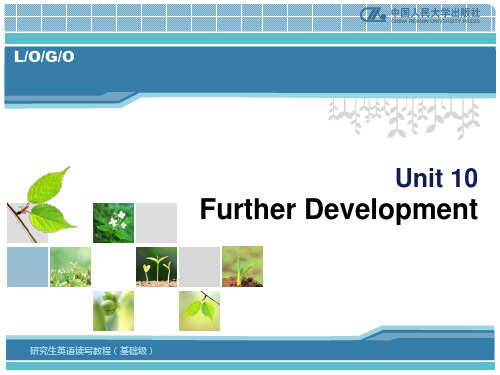
了,有再开的时候。
1.2 C-E Translation Techniques & Practice
1.1 E-C Translation Techniques & Practice
2)译成并列分句,省略英语先行词 - A good deal went on in the steppe which he–her father—did not know. 译文:草原上发生了许多事情,他—她的父亲—并不知道。 - He managed to raise a crop of 200 miracle tomatoes that weighed up to two pounds each. 译文:他居然种出了200个奇迹般的西红柿,每个重达两磅。
1.2 C-E Translation Techniques & Practice
二、复句的增译法
(一)语义性增词 (二)结构性增词 (三)为沟通不同文化而增词
1.2 C-E Translation Techniques & Practice
(一)语义性增词
中西思维的鲜明反差沉淀在各自的语言中,表现为汉语在总体上 偏模糊性、笼统性和朦胧性,而英语偏精确性、严密性和明晰性。 所以在汉译英时常常需要增补词语,使译文准确而完整地传达原 文的意思。 - 一个篱笆三个桩,一个好汉三个帮。 译文:A fence needs the support of the three stakes; a capable fellow needs the help of three people. - 我死了以后有我的儿子,儿子死了又有孙子,子子孙孙是无穷 尽的。 译 文 : After I die, my son will carry on the job; and after my son dies, my grandson will carry on the job. Then there will be their sons and grandsons and so on.
94-07陈正康考研英语超精读(完美打印版)
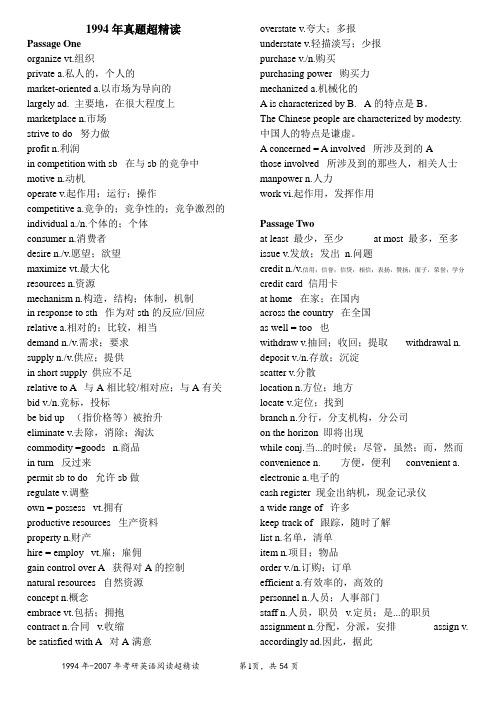
1994年真题超精读Passage Oneorganize vt.组织private a.私人的,个人的market-oriented a.以市场为导向的largely ad. 主要地,在很大程度上marketplace n.市场strive to do 努力做profit n.利润in competition with sb 在与sb的竞争中motive n.动机operate v.起作用;运行;操作competitive a.竞争的;竞争性的;竞争激烈的individual a./n.个体的;个体consumer n.消费者desire n./v.愿望;欲望maximize vt.最大化resources n.资源mechanism n.构造,结构;体制,机制in response to sth 作为对sth的反应/回应relative a.相对的;比较,相当demand n./v.需求;要求supply n./v.供应;提供in short supply 供应不足relative to A 与A相比较/相对应;与A有关bid v./n.竞标,投标be bid up (指价格等)被抬升eliminate v.去除,消除;淘汰commodity =goods n.商品in turn 反过来permit sb to do 允许sb做regulate v.调整own = possess vt.拥有productive resources 生产资料property n.财产hire = employ vt.雇;雇佣gain control over A 获得对A的控制natural resources 自然资源concept n.概念embrace vt.包括;拥抱contract n.合同v.收缩be satisfied with A 对A满意overstate v.夸大;多报understate v.轻描淡写;少报purchase v./n.购买purchasing power 购买力mechanized a.机械化的A is characterized by B. A的特点是B。
研究生英语阅读教程基础级10
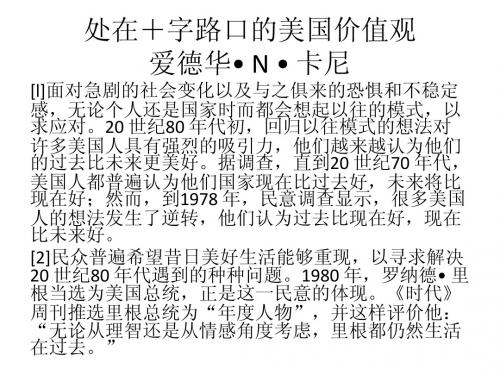
[6]美国人向来都不重视资源保护。因为地大物博,美国人 一开始就相信他们的资源取之不尽,用之不竭。在这种环 境下,保护资源就显得没有必要。第二次世界大战后,美 国人认为现代技术能创造奇迹,能永无止境地提高生活水 平。因此,20 世纪80 年代前的美国,与个人自由、机会 平等、勤奋努力、积累财富等价值观相比,资源保护就显 得不那么重要。 [7]有证据显示,20 世纪70 年代美国人所经历的更严重的 能源短缺迫使美国人重视资源保护。例如,70 年代末的一 项民意调查显示,有66 %的美国人赞同这一说法:“我并 不会因为可能的能源短缺而不高兴,因为我知道这将促使 我提高每一件物品的使用效率,并减少浪费。” [8]但是,有一些人却认为类似的民意调查只能说明部分事 实,而不是全部。虽然美国人可能会赞同支持保护能源的 价值观,但却不会付诸于日常的行动中。 [9]因此,与美国人的其他观念相比,保护资源的观念依然 淡薄。只有当美国人越来越清楚地意识到其必要性,才能 增强保护观念。新的保护观念需融入旧的基本价值观中, 才能帮助美国解决未来的问题。
[15]美国人一直认为小团体之间的合作是重要的,如家庭、 社区、教区。但涉及政府的、大规模的举国合作,就是胁 迫性的、破坏性的,而不是自愿的、建设性的。美国人往 往会认为国家的强大更多地源于个人自由、机会均等、勤 奋努力、竞争取胜等价值观念而不是源于举国合作。 [16]但是20 世纪80 年代的需求迫使美国人更重视举国合作 的价值。这很有可能是因为他们所面临的一些问题没有举 国合作是不能解决的,如资源短缺、空气污染和水污染等。 [17]假如美国人选择比以往更重视举国合作,他们很有可 能会非常谨慎。为了保护个人自由,他们将会采取一步一 步、一个问题一个问题解决的循序渐进的方式,而不会采 取暴风骤雨似的一揽子解决方案。因长期自治的传统,他 们很可能会坚持在向举国合作迈出任何一步前,都要进行 充分的公众讨论。 [18]一些观察家认为,这种缓慢而谨慎的态度太过胆小乏 力,无法迎接未来的挑战。但美国人则认为,以国家利益 之名,骤然实行根本性的变革,通常会导致独裁统治,不 仅问题依然无法得到解决,还会失去个人自由。
英语精读课教案模板

英语精读课教案模板第1篇:英语精读(综合)1教案英语精读(综合)1教案教材:《新编英语教程》1课时:96课时Unit 1 I Objectives: 1.Simple past and present perfect tense 2.Past progreive tense 3.Past perfect tenseII Time Allotment: 1st period: Language structure practice 2nd period: Dialogue 1 3rd period: Dialogue 2 and oral practice 4th period: Readings 5th period: Exercises in the Workbook 6th period: Note writing and aignmentsIII Teaching tasks and proce Part One Language Structures & Dialogues 1.Grammar review 1.Simple past and present perfect tense Verbs in sentences beginning with “This is the first/second… time are in the present perfect form.For example,This is the first time I’ve been in Xi’an.This is the second time I’ve seen this movie.2.Past progreive tense Past progreive is a combination of the progreive aspect with the past tense.The use of the past progreive has much in common with that of the present progreive, only the time reference being pushed back to the past, often overtly expreed by a time –when/while adverbial.For example,Susan was washing her hair while her mother was cooking.Dick was changing a flat tire while his father was mowing the lawn.3.Past perfect tense For the past perfect tense we set up an additional focal point in the past and say that another act was completed before that time.For example, Greg had finished his work when I visited him. The chair had collapsed before I sat on it. In-cla Activity One Ask thestudents to fill in the gaps in each dialogue while listening to the recording and then do the substitution exercises.nguage points Have the students listen to the recording of DialogueI once or twice and ask them questions on specific details.Go through the dialogue and explain some language points:1.You know what? – This question is used to introduce a piece of information which is surprising.A similar expreion is Gue what?.2.scenic spots – places of natural attractive scenery3.I was greatly impreed by its natural beauty.– I was moved by its beautiful scenery.impre – to influence deeply, esp.with a feeling of admiration: The students were impreed by his inspiring speech./ We are impreed by his performance.4.I bet you had lots of fun there.– I am certain you had lots of fun there.Another example, I bet (that) it will rain tomorrow.5.It brought back such sweet memories.– Sweet memories came to my mind.bring back –to cause to return to the mind: Hearing the song brought back happy memories.6.You remind me of my last trip there.– It seems to be similar to my last trip there.remind sbdy.of sbdy./sthg.–to appear to be similar to; to cause to remember : This museum reminds me of the one we visited last year./ The event reminded me of my school days.7.I wish I had been there with you this time.– This is a wish abouta non-fact in the past.Another example, I wish I had paed the exam.8.hobby groups –different groups of students claified by hobbies.9.Some staged an exhibition.– Some held an exhibition.stage –to perform or arrange for public show; put on: The art group is going to stage an art show on Sunday.IV Discuion In-cla Activity1.Ask the students to read Dialogue I aloud in pairs with feeling andexpreion. 2.Ask the students to listen to Dialogue II and then retell it.3.Make a dialogue discuing about one of your traveling experiences. V Aignments:1.Work in pairs to practice the situation in each dialogue.2.Work in groups to discu the topic of “How I spent the summer vacation”.3.Have the students form their own dialogues by using the phrases from Dialogues I & II.4.Do the corresponding exercises in WB.Part Two Readings Have the students read the paage first and do the corresponding exercise in workbook.Then the teacher may ask them questions in cla to check their comprehension. I Language points:1.Herbert went to France for holiday.–For is an preposition used here to show purpose: I came to this building for an interview./ What is this handle for?2.run out of – to use all one’s supplies, to have no more:I am afraid we’ve run out of sugar.3. expect –to think or believe (that something will happen): I expect that she will come to our party./The spokesman is expected to make an announcement later on today.4.The back door burst open.–The door opened suddenly.burst –to come into the stated condition suddenly and often violently: In spring the flowers burst open./He burst free from the chains.Another similar use of the pattern: The door banged shut.5.peer at – to look very carefully or hard, esp.as if not able to see clearly peek at –to take a quick look at something when one should not peep at – to look at something quickly and secretly, esp.through a hole or other small opening6.convince –to make (someone) completely certain about something; persuade: They failed to convince the directors that their proposal would work./ I am convinced by your story.7.a sound sleeper – a deep sleeper 8.to thumb a ride/lift – to askpaing motorists for a free ride by holding out one’s hand with the thumb raised 9.made his way in the dark – went in the dark: He made his way home.10.He was not supposed to be back.–He was not considered to be back.Be supposed to – to be intended to; to be generally considered to be; to have the regulation of being: The volunteers are supposed to help the blind in the street./I haven’t read this novel, but it is supposed to be a good one.11.to keep an eye on – to watch carefully: I often ask my neighbor to keep an eye on my house while I am away.12.was about to – This construction exprees the immediate future in the past.In some contexts, it is often used in the sense of an unfulfilled intention.For example, I was about to leave when he came to visit me. II Note-writing Notes must be precise and direct; however, the style is casual.In notes of introduction, the following are usually included: 1.The name of the person to be introduced 2.His/Her identity 3.The purpose of the introduction 4.Appreciation III Aignments:1.Write a note of introduction2.Exercises in WB第2篇:初级汉语精读课教案编写教案选择下列课本中任何一课,完成2000字以上的教案。
- 1、下载文档前请自行甄别文档内容的完整性,平台不提供额外的编辑、内容补充、找答案等附加服务。
- 2、"仅部分预览"的文档,不可在线预览部分如存在完整性等问题,可反馈申请退款(可完整预览的文档不适用该条件!)。
- 3、如文档侵犯您的权益,请联系客服反馈,我们会尽快为您处理(人工客服工作时间:9:00-18:30)。
2012考研英语十年真题超精读教案(基础篇)前言问:如何提高阅读分数?答:先提高阅读能力。
问:如何提高阅读能力?答:单词;精读;泛读。
这是一个困扰了无数考研学子的问题,众所周知,得阅读者得天下,然而要真正提高阅读分数必先真正提高阅读能力。
因此,多年来,我始终倡导,要真正搞懂吃透考研历年英语的真题,在考研英语这个科目中得高分就必须对这些试卷进行“超精细阅读”。
所谓超精细阅读,就是非常精细的阅读,是一字不漏,通晓全文的精读。
要真正做到“细读”,必须做到如下三点:第一,真题中没有一个单词是生词。
这一标准强调的是词汇。
对于一个单词的形(拼写)、音(发音)、义(含义),我们要有一个从认知到应用的转变。
考研英语,并不要求同学们有海量的词汇储备,而是要求对词汇的一词多意,熟词生意和衍生词有深刻的把握。
第二,真题中没有一个句子是难句。
在复习的过程中,同学们如果能做到过去十年的考研真题中,任意挑出一个句子,就立刻能够看懂它,并把它翻译成汉语,那么我坚信考研英语必然能得高分。
第三,任何一道选择题,真正吃透正确选项为什么对,错误选项为什么错。
选择题的基本命题理念,就是用一些错误的选项来干扰大家的思路,从而考察大家在对和错之间的选择。
我们如果想一步一步地修正自己的做题思路,让自己的思路和命题专家的思路高度统一,就必须不仅知道正确选项其正确在什么地方,而且还要明晰错误的选项凭什么错,只要经过认真系统的准备,才能实现眼中只有正确答案的境界!因此,在考研英语复习的基础阶段,同学们应该坚持每天超精细阅读一篇文章(基础阶段可以按照计划重复精读90年到2000年十年真题的文章),在真题中复习核心词汇,复习核心语法及长难句,并培养良好的语感和做题状态,提高阅读速度,迅速把握文章的主题。
为了便于大家用超精细阅读的方法复习,结合多年授课的经验,我特意编写了这本《考研英语十年真题超精读考案(基础篇)》,每篇考研文章均给出了核心词汇详解、长难句精译、全文翻译及思路解析。
不谓呕心沥血,也称得上汗水之作,望诸君善待。
祝大家考研成功。
编者2011年1月1日目录前言 (1)目录 (2)1990年阅读理解 (4)Passage 1 (4)Passage 2 (7)Passage 3 (11)1991年阅读理解 (15)Passage 1 (15)Passage 2 (19)Passage 3 (23)1992年阅读理解 (27)Passage 1 (27)Passage 2 (32)Passage 3 (36)1993年阅读理解 (41)Passage 1 (41)Passage 2 (46)Passage 3 (51)1994年阅读理解 (56)Passage 1 (56)Passage 2 (60)Passage 3 (65)Passage 4 (70)Passage 5 (74)1995年阅读理解 (79)Passage 1 (79)Passage 2 (84)Passage 3 (87)Passage 4 (92)Passage 5 (97)1996年阅读理解 (102)Passage 1 (102)Passage 2 (106)Passage 3 (110)Passage 4 (115)Passage 5 (120)1997年阅读理解 (124)Passage 1 (124)Passage 2 (129)Passage 3 (133)Passage 4 (137)Passage 5 (141)1998年阅读理解 (145)Passage 1 (145)Passage 2 (149)Passage 3 (154)Passage 4 (159)Passage 5 (164)1999年阅读理解 (168)Passage 1 (168)Passage 2 (173)Passage 3 (177)Passage 4 (182)Passage 5 (188)2000年阅读理解 (193)Passage 1 (193)Passage 2 (199)Passage 3 (204)Passage 4 (209)Passage 5 (214)1990年阅读理解Passage 1In May 1989, space shuttle “Atlantis” released in outer space the space probe “Megallan,” which is now on her 15-month and one-billion-kilometer flight to Venus. A new phase in space exploration has begun.The planet Venus is only slightly smaller than Earth; it is the only other object in the solar system, in fact, that even comes close to earth’s size. Venus has a similar density, so it is probably made of approximately the same stuff, and it has an atmosphere, complete with clouds. It is also the closest planet to earth, and thus the most similar in distance from the sun. In short, Venus seems to justify its long-held nickname of “earth’s twin.”The surface temperature of Venus reaches some 900F. Added to that is an atmospheric pressure about 90 times Earth’s: High overhead in the carbon dioxide (CO2) that passes for air is a layer of clouds, perhaps 10 to 20 miles thick, whose little drops consist mostly of sulfuric acid (H2SO4). ③Water is all but nonexistent.①Born with so many fundamental similarities to earth, how did V enus get to be so radically different: It is not just an academic matter. ②For all its extremes, Venus is a valuable laboratory for researchers studying the weather and climate of earth. ③It has no earth’s oceans, so the heat transport and other mechanisms are greatly simplified. ④In addition, the planet Venus takes 243 earth-days to turn once on its axis, so incoming heat from the sun is added and distributed at a more leisurely, observable pace.核心词汇详解★★★release [ri'lis] v. 放出,释放object ['ɔbdʒikt]n.物体;对象; 客体;目标; 意向; 目的;宾语.[əb'dʒekt]vi.不赞成, 反对; 抗议vt.以…为理由反对atmosphere ['ætməsfiə]n.大气, 大气层;空气;气氛, 环境consist [kən'sist]vi.组成, 构成;在于, 存在于justify ['dʒʌstifai]vt.证明…有理; 为…辩护fundamental [fʌndə'mentəl]adj.基本的; 重要的, 必要的n.基本原则, 基本法则radically ['rædikəli]adv.根本地, 基本地; 彻底地, 完全地;激进地, 激进派地academic [ækə'demik]adj.学校的, 学院的;学术性的;纯理论的, 不切实际的; n.大学教师; 专业学者simplify ['simplifai]vt.使(某事物)简单[简明]; 简化distribute [dis'tribju:t]vt.分配, 分给;散发; 散播; 分布★★Nonexistent [nɔniɡ'zistənt]adj.不存在的,不现存的,n.不存在的事物Mechanism ['mekənizəm]n.机械装置;构造, 机制;办法, 技巧, 途径phase [feiz] n. 阶段vt.分阶段计划[安排]density ['densiti] n. 密度approximately [əˈprɔksimitli] ad. 大概,大约leisurely[ˈli:ʒəli, ˈleʒə-] ad. 慢慢地,悠然地All but 几乎★nickname ['nikneim]n.绰号, 诨名; 昵称shuttle ['ʃʌtl] n. 返汽车(列车,飞机);航天飞机,航天器vt. & vi.穿梭般来回移动stuff [stʌf] n. 材料,东西passes for 被当成sulfuric [sʌlˈfjʊərɪk] a. 硫的acid [ˈæsid]n. 酸性物质,酸axis[ˈæksis] n. 轴(线)长难句精析1. In May 1989, space shuttle “Atlantis” rele ased in outer space the space probe “Megallan,” which is now on her 15-month and one-billion-kilometer flight to Venus.该句主干为space shuttle “Atlantis” released … the space probe “Megallan”,which引导的定语从句做后置定语,修饰先行词the space probe “Megallan”。
